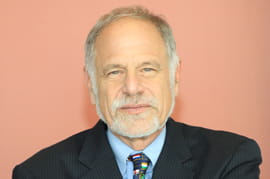Roger Dennis, Founding Dean of Kline School of Law, to Retire
 By Mark Eggerts
By Mark Eggerts

Provost M. Brian Blake, PhD, announced that Roger Dennis, founding dean of the Thomas R. Kline School of Law, will retire next year. Dennis has agreed to stay on through the end of the 2016-17 academic year while the University undertakes a national search for his replacement.
Dennis joined the law school during its inaugural academic year, 2006-07. He led the school through the American Bar Association accreditation process in the shortest amount of time possible, resulting in full accreditation in 2011. Dennis also was instrumental in building connections with the Philadelphia legal community, including the relationship that led to noted trial attorney Thomas R. Kline making the largest gift in Drexel history to the school that now bears his name.
“Through one of the most tumultuous times in legal education, Roger has remained the driving force behind [this] innovative and successful institution,” wrote Blake. “As a new provost this year, I am fortunate to benefit from Roger’s expertise as a former provost himself, in addition to his many contributions to our scholarly programs in the Kline School of Law and across [Drexel].”
Under Dennis’s leadership, the Kline School introduced programs including the accelerated 2-year JD, the LLM in American Legal Practice and the Master of Legal Studies program. He led the implementation of a professional practice requirement for JD students, and the creation of a Professional Development Fund to support students as they enter the bar and undertake their career search. He was also instrumental in the creation of the Thomas R. Kline Institute for Trial Advocacy which will open this fall at 1200 Chestnut Street, in a landmark building that was part of Kline’s gift to Drexel.
“Dean Dennis’s strength has been in recruiting faculty who are both exceptional scholars and practitioners, and in attracting students who share Drexel’s entrepreneurial spirit and are deeply committed to becoming skilled and principled professionals,” said Blake. “[He] and his faculty have developed an innovative curriculum that set the bar for experiential learning in the legal setting, integrating clinics, legal methods, in-class simulation, pro bono service and Drexel’s signature focus on cooperative education.”
In This Article
Drexel News is produced by
University Marketing and Communications.
